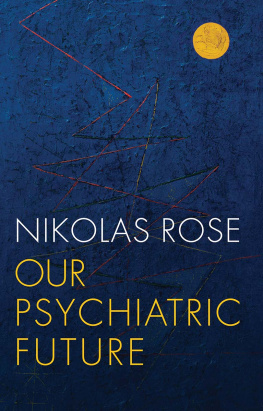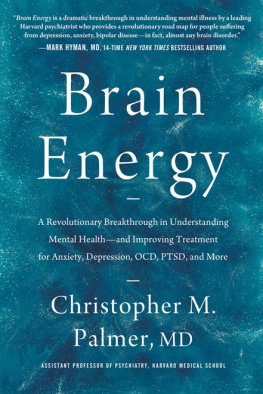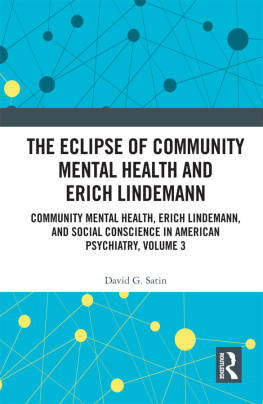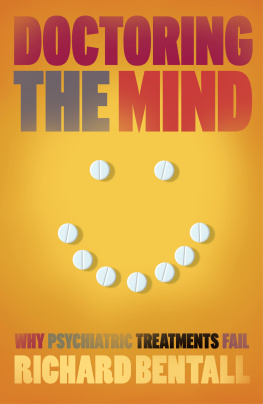Contents
Guide
Pages

For Diana
Our Psychiatric Future
The Politics of Mental Health
Nikolas Rose
polity
Copyright Nikolas Rose 2019
The right of Nikolas Rose to be identified as Author of this Work has been asserted in accordance with the UK Copyright, Designs and Patents Act 1988.
First published in 2019 by Polity Press
Polity Press
65 Bridge Street
Cambridge CB2 1UR, UK
Polity Press
101 Station Landing
Suite 300
Medford, MA 02155, USA
All rights reserved. Except for the quotation of short passages for the purpose of criticism and review, no part of this publication may be reproduced, stored in a retrieval system or transmitted, in any form or by any means, electronic, mechanical, photocopying, recording or otherwise, without the prior permission of the publisher.
ISBN-13: 978-0-7456-8915-9
A catalogue record for this book is available from the British Library.
Library of Congress Cataloging-in-Publication Data
Names: Rose, Nikolas S., author.
Title: Our psychiatric future : the politics of mental health / Nikolas Rose.
Description: Medford, MA : Polity, [2018] | Includes bibliographical references and index.
Identifiers: LCCN 2018009173 (print) | LCCN 2018011035 (ebook) | ISBN 9780745689159 (Epub) | ISBN 9780745689111 (hardback) | ISBN 9780745689128 (pbk.)
Subjects: | MESH: Mental Health | Psychiatry | Health Policy
Classification: LCC RC454 (ebook) | LCC RC454 (print) | NLM WM 101 | DDC 616.89--dc23
LC record available at https://lccn.loc.gov/2018009173
The publisher has used its best endeavours to ensure that the URLs for external websites referred to in this book are correct and active at the time of going to press. However, the publisher has no responsibility for the websites and can make no guarantee that a site will remain live or that the content is or will remain appropriate.
Every effort has been made to trace all copyright holders, but if any have been inadvertently overlooked the publisher will be pleased to include any necessary credits in any subsequent reprint or edition.
For further information on Polity, visit our website: politybooks.com
Acknowledgements
I have been thinking about the issues in this book since my time as an undergraduate in the 1960s. I was struck by the contrast between the image of psychiatry in my course on abnormal psychology and the experiences of my friends diagnosed with serious mental illness and undergoing treatment with antipsychotic drugs. Later I became involved with the critical psychiatry movement and with the work of concept houses such as those run by the Richmond Fellowship, and I also taught an evening class with Peter Miller on the powers of psychiatry, which led to our edited volume The Power of Psychiatry, published by Polity in 1986. In the 1980s at Brunel University I convened a unique undergraduate programme which combined a degree in sociology and psychology with a qualification as a psychiatric nurse teaching the remarkable students and visiting them on the wards in the Maudsley and Bethlem Hospitals brought me face to face with the challenges faced by dedicated psychiatric professionals, and gave me a clearer sense of the lives of those for whom they tried to care.
Over the intervening years, I have got to know many committed and thoughtful mental health professionals who are painfully aware of the challenges they face in trying to help individuals who are in distress, usually for reasons located not in their heads, but in the social conditions in which they find themselves. I have spent some time visiting mental institutions both in the UK and in a number of other countries. I have engaged with these issues via my work with the Nuffield Council on Bioethics, the Science Policy Committee of the Royal Society and similar organizations, and my research in the Social and Ethical Division of the Human Brain Project. I have been fortunate to have friends with first-hand experience of the ministrations of the mental health system, and who have worked collectively to find new ways of thinking about and responding to mental distress. And I have lived for more than 40 years with a partner diagnosed with a severe and enduring psychiatric disorder. This book grows out of that relationship, that history and debates too numerous to mention. But while many people have helped me in developing my arguments, only I am culpable for them.
I have touched on the questions I discuss here in other books notably in The Politics of Life Itself published in 2007, and in Neuro: The New Brain Sciences and the Management of the Mind, written with Joelle Abi-Rached and published in 2013 and I have tried not to repeat myself; some of the things I address briefly here are given fuller treatments in those earlier books. Most of the chapters that follow arise from lectures that I have given since 2010. I would particularly like to thank Dr Franco Rotelli in Trieste for persuading me to take up the daunting challenge of giving the opening keynote lecture at an International Conference in 2010 celebrating the life and work of Franco Basaglia. That lecture All in the Brain? morphed into a rather different one, entitled What Is Mental Illness Today? Five Hard Questions, which I first gave at the University of Nottingham in 2013; I thank Hugh Middleton for inviting me. That led, in a roundabout way, to Nick Manning joining me as a colleague at Kings College London, which has resulted in many fruitful collaborations on the issues I discuss in this book; he and I share the view that sociology is a fundamental science when it comes to understanding mental ill health. Some years ago I worked closely with Ilina Singh on the promises and perils of biomarkers, and I draw upon ideas developed in that collaboration. Des Fitzgerald and Ilina Singh worked with me on a related project the Urban Brain Project which helped me develop a number of the ideas that have found their way into various parts of this book. That project also led to a book with Des entitled Vital City: Metropolitan Life, Mental Health and the Urban Brain, to be published by Princeton University Press, some thoughts from which are included in my final chapter. I have also benefited from collaborations with Ayo Wahlberg which started many years ago in Copenhagen, continued in the BIOS Centre at the LSE, extended to our work in China, and now to his research back in Copenhagen Ayo has generously given me permission to draw on sections of our joint paper, The Governmentalization of Living: Calculating Global Health, published in Economy and Society in 2015, in of this book. I have learned a lot from the generous historical scholarship on medicine, psychiatry and madness by Roy Porter: his voice is much missed in current debates. On general issues of the politics of life, I have benefited greatly, though he probably does not know this, from the work of Didier Fassin. Emily Martins work remains an inspiration, to me as to many others, and her friendship is much valued. In many ways, this book grows out of the research on the genealogy of neuroscience that I conducted with Joelle Abi-Rached for Neuro, and I thank her for being the most excellent companion on that journey into the history of the present of neuroscience.
Among the other people who have invited me to lecture on these topics, and whose challenging questions have contributed sometimes without them being aware to these chapters are Sergio Carvalho, Tulio Giraldi, Ilpo Helen, Lochlann Jain, Uffe Juul Jensen, Pat OMalley, Francisco Ortega, Andreas Roepstorff, George Szmukler, Mariana Valverde, Catherine Waldby, Simon Wessley and Elizabeth Wilson. I would also like to acknowledge the abiding influence on my thought of the students who took my courses on psychiatry and mental health at Brunel University, particularly Hilary Allen, Edana Minghella, Helen Griffin, Ben Thomas and Rob Tunmore. Thanks also to all those students and postdoctoral fellows who have debated these questions with me over the last three decades and more, many of whom are now in senior academic positions. I cannot mention them all, but especially would like to acknowledge Lisa Blackman, Des Fitzgerald, Angela Filipe, Ian Hodges, Linsey McGoey, Sam McLean, Lonie Mol, Tara Mahfoud, Sebastian Rojas Navarro, Carlos Novas, Scott Vrecko and Ayo Wahlberg.











